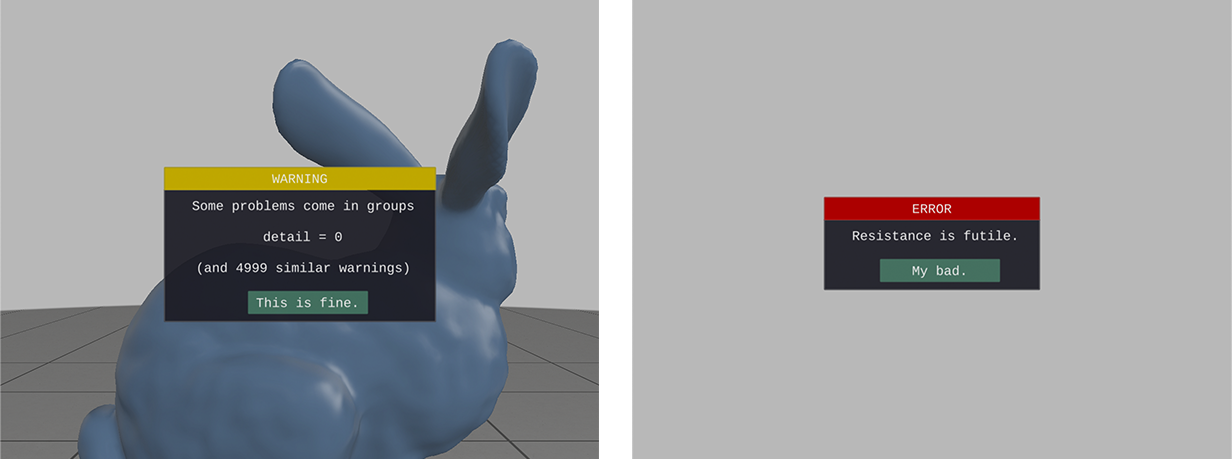Messages
Using messages
We’ve all been there: a crucial error message gets printed to the terminal, but lost in a tempest of text—noticing that error message could have saved two hours of debugging. Polyscope contains a simple system for showing message dialogs in the UI which are sure to be noticed but stay out of the way.
There are a few levels of messages available:
- error A very bad error; immediately shows and blocks the UI for user response.
- terminating error Like
error, but terminates the program after being dismissed. - warning A medium priorty warning, shown the next time UI main loop executes. Warnings of the same type can be batched together, so these messages can be issued in a dense loop without drowning the program.
- info A low-priority message, which is just printed to
stdout.
Messages can be dismissed by clicking the button in dialog box, or pressing [space].

Example:
#include "polyscope/polyscope.h"
// Generate a single warning.
// Has no effect on the GUI until polyscope gets control flow
// back, which happens here in the show() call below.
polyscope::warning("Something went slightly wrong");
// Generate a lot of warnings. Becase all of these warnings
// have the same base message (the first string), they will
// be batched together and only shown as one dialog. The detail
// message for the first such warning will also be shown.
for (int i = 0; i < 5000; i++) {
polyscope::warning("Some problems come in groups",
"detail = " + std::to_string(i));
}
// The previous warnings would be displayed here
polyscope::show();
// Generating an error.
// The UI will block and show this error immediately. After
// the error is dismissed, the call will return.
polyscope::error("Resistance is futile.");
// Generate a fatal error.
// After the error is dismissed, the program will terminate.
polyscope::terminatingError("Resistance is futile.");
// Disable the in-window popups, just print to stdout
polyscope::options::displayMessagePopups = false;
Messages
void polyscope::info(std::string message)
info
Simply logs a message to stdout.
void polyscope::warning(std::string baseMessage, std::string detailMessage = "")
warning
Create a warning message, to be displayed the next time the UI gets flow control.
When issuing a one-off warning, the detailMessage field need not be used. However, if issuing warnings in a loop, warnings with the same baseMessage are batched together, so the UI doesn’t get completely overwhelmed.
Example:
#include "polyscope/polyscope.h"
// Generate a single warning.
// Has no effect on the GUI until polyscope gets control flow
// back, which happens here in the show() call below.
polyscope::warning("Something went slightly wrong");
// Generate a lot of warnings. Becase all of these warnings
// have the same base message (the first string), they will
// be batched together and only shown as one dialog. The detail
// message for the first such warning will also be shown.
for (int i = 0; i < 5000; i++) {
polyscope::warning("Some problems come in groups",
"detail = " + std::to_string(i));
}
// The previous warnings would be displayed here
polyscope::show();
void polyscope::error(std::string message)
error
Generate an error, which is immediately shown in the GUI. After the error dialog is dismissed in the GUI, this function returns.
void polyscope::terminatingError(std::string message)
terminating error
Generate an error, which is immediately shown in the GUI. After the error dialog is dismissed in the GUI, the program terminates.
Options
bool options::displayMessagePopups
display message popups
If true, warning and error popup dialogs are shown in the UI and printed to stdout. If false, they are only printed to stdout (assuming verbosity > 0).
Default: true